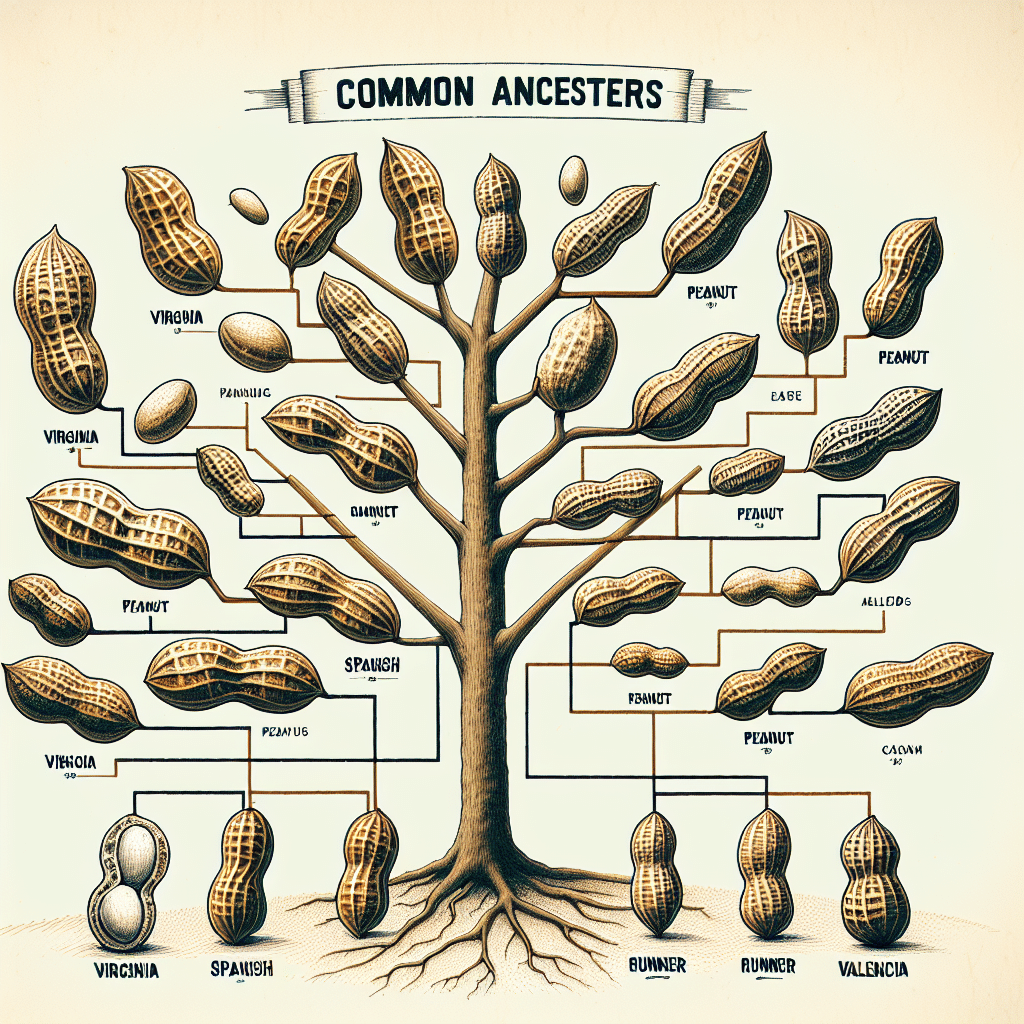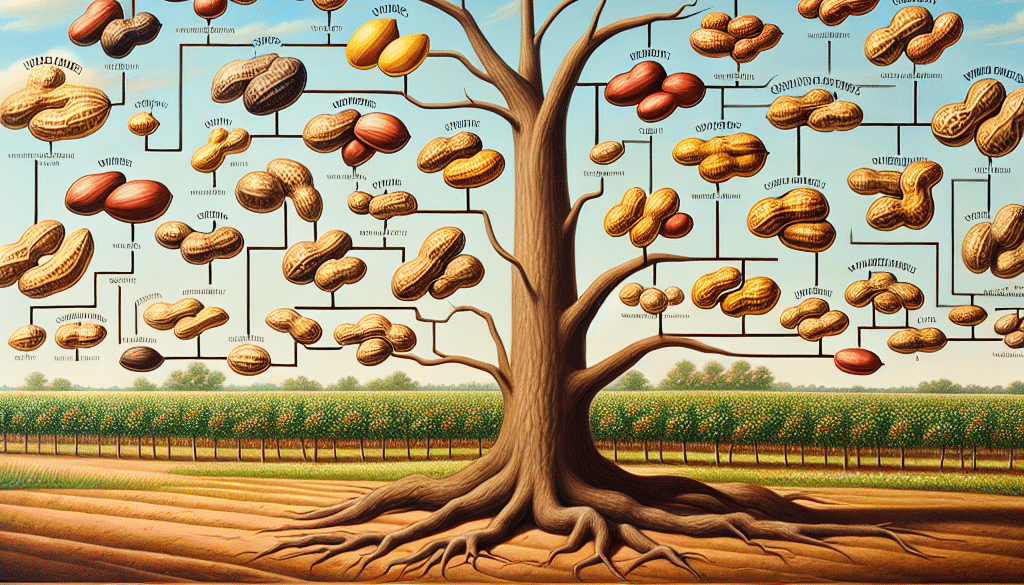Peanuts Family Tree: Tracing Nutty Lineages
-
Table of Contents
- Peanuts Family Tree: Exploring the Nutty Ancestry and Varieties
- The Origins of Peanuts
- Wild Ancestors and Genetic Diversity
- Classification and Types of Peanuts
- Genetic Improvement and Breeding
- Global Peanut Cultivation and Trade
- Case Studies: Peanut Breeding Successes
- Conclusion: The Ever-Evolving Peanut Family Tree
- Discover ETprotein’s High-Quality Peanut Protein Products
Peanuts Family Tree: Exploring the Nutty Ancestry and Varieties

Peanuts, also known as groundnuts, are not only a popular snack but also an important agricultural commodity. Despite their common name, peanuts are not true nuts but legumes, related to beans and lentils. The peanut family tree is a fascinating subject, tracing the lineage of this beloved food source from its wild ancestors to the diverse varieties we consume today. In this article, we will delve into the history, genetics, and evolution of peanuts, providing valuable insights into their nutty lineages.
The Origins of Peanuts
The peanut plant, scientifically known as Arachis hypogaea, has a rich history that dates back thousands of years. The plant is believed to have originated in South America, where it was cultivated by ancient civilizations. Archaeological evidence suggests that peanuts were grown in Peru as far back as 3,500 years ago. From South America, peanuts spread to other parts of the world through Spanish and Portuguese explorers.
Wild Ancestors and Genetic Diversity
The wild ancestors of the domesticated peanut are crucial to understanding its genetic diversity. Two wild species, Arachis duranensis and Arachis ipaensis, are considered the primary progenitors of the cultivated peanut. These species contributed to the peanut’s genetic makeup through a process called allopolyploidy, where two different species hybridize and double their chromosome number, resulting in a new species.
- Arachis duranensis: This species is found in Argentina, Bolivia, and Paraguay and has contributed the ‘A’ genome to the cultivated peanut.
- Arachis ipaensis: Discovered in Bolivia, this species has contributed the ‘B’ genome, completing the genetic structure of the cultivated peanut.
Classification and Types of Peanuts
Peanuts are classified into several types based on their pod size, shape, and kernel characteristics. The four main types of peanuts grown commercially are Runner, Virginia, Spanish, and Valencia.
- Runner Peanuts: Known for their uniform size and shape, Runner peanuts are widely used in peanut butter production.
- Virginia Peanuts: Larger in size, Virginia peanuts are often sold as gourmet snacks and used for in-shell roasting.
- Spanish Peanuts: These peanuts have smaller kernels with a higher oil content, making them ideal for candy and peanut oil.
- Valencia Peanuts: Typically sweeter and sold in-shell, Valencia peanuts are commonly roasted and used in all-natural peanut butter.
Genetic Improvement and Breeding
Over the years, peanut breeding has focused on improving yield, disease resistance, and nutritional quality. Advances in genetic research have allowed scientists to identify specific genes responsible for desirable traits, leading to the development of new peanut varieties with enhanced characteristics.
- Disease Resistance: Breeding programs have introduced resistance to common peanut diseases such as leaf spot and peanut rust.
- Yield Improvement: High-yielding varieties have been developed to meet the growing demand for peanuts worldwide.
- Nutritional Enhancement: Efforts have been made to increase the protein and oleic acid content in peanuts for better health benefits.
Global Peanut Cultivation and Trade
Peanuts are cultivated in tropical and subtropical regions around the world. China, India, and the United States are among the top producers. The global peanut trade involves not only raw peanuts but also processed products like peanut oil, butter, and flour.
- China: The largest producer of peanuts, China focuses on both domestic consumption and export.
- India: India’s peanut production caters mainly to domestic needs, with a significant portion used for oil extraction.
- United States: The U.S. is known for its high-quality peanuts, with Georgia being the leading state in peanut production.
Case Studies: Peanut Breeding Successes
Several case studies highlight the success of peanut breeding programs. For instance, the development of the Florunner variety in the 1960s revolutionized peanut farming in the United States by significantly increasing yields. More recently, the introduction of the Georgia Green variety has provided resistance to tomato spotted wilt virus, a major peanut disease.
Conclusion: The Ever-Evolving Peanut Family Tree
The peanut family tree is a testament to the adaptability and resilience of this crop. From its origins in South America to its current status as a global agricultural staple, the peanut has undergone significant genetic changes. Through breeding and research, new varieties continue to emerge, offering better yields, disease resistance, and nutritional profiles. Understanding the lineage and diversity of peanuts is not only fascinating but also essential for ensuring the sustainability and growth of this important crop.
Discover ETprotein’s High-Quality Peanut Protein Products
If you’re interested in incorporating the nutritional benefits of peanuts into your diet or products, ETprotein offers a range of high-quality peanut protein options. Their peanut protein is characterized by a neutral taste and non-GMO, allergen-free attributes, making it an excellent choice for various applications in the food and beverage industry.
ETprotein’s commitment to quality and customer satisfaction makes them a top choice for sourcing organic bulk vegan protein and plant proteins. Whether you’re a manufacturer, trader, or distributor, ETprotein can meet your protein needs with their extensive product range.
About ETprotein:
ETprotein, a reputable protein Chinese factory manufacturer and supplier, is renowned for producing, stocking, exporting, and delivering the highest quality organic bulk vegan protein and plant proteins. They include Organic rice protein, clear rice protein, pea protein, clear pea protein, pumpkin seed protein, sunflower seed protein, mung bean protein, peanut protein etc. Their offerings, characterized by a neutral taste, non-GMO, allergen-free attributes, cater to a diverse range of industries. They serve nutraceutical, pharmaceutical, cosmeceutical, veterinary, as well as food and beverage finished product distributors, traders, and manufacturers across Europe, USA, Canada, Australia, Thailand, Japan, Korea, Brazil, and Chile, among others.
ETprotein specialization includes exporting and delivering tailor-made protein powder and finished nutritional supplements. Their extensive product range covers sectors like Food and Beverage, Sports Nutrition, Weight Management, Dietary Supplements, Health and Wellness Products, and Infant Formula, ensuring comprehensive solutions to meet all your protein needs.
As a trusted company by leading global food and beverage brands and Fortune 500 companies, ETprotein reinforces China’s reputation in the global arena. For more information or to sample their products, please contact them and email sales(at)ETprotein.com today.














